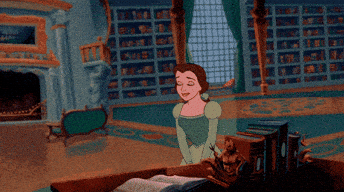Time is money, especially overtime.
Howdy, this is UniScoops! We’re the only message that you’ve read today and didn’t half-swipe before opening (hopefully).
So, without further ado…
Here’s a taste of what we’re serving today:
Who Decides the Literary Canon? 📚
PLUS: Coral Engineering, Las Meninas, and Crying.
ENGLISH
Who Decides the Literary Canon? 📚
You may have been encouraged by teachers or parents to read certain books from what is known as the literary canon. In essence, the canon is a list of works that are universally acknowledged to be of the greatest calibre or quality. Historically, a select group of academics and critics have created our cultural canons, taking a piece of art and elevating it to the canon status. Harold Bloom has become widely considered the ‘father’ of the canon. His book ‘The Western Canon: The Books and School of the Ages’ became a best-seller in 1994 due to its argument about what was and wasn't part of the canon.

I’m sure Matilda would have a lot to say about the canon …
💡 Things to consider
Inaccuracy of the canon: The majority of the writers in the Western canon are deceased white men, which has created a constant source of controversy. Those who oppose the canon argue that it needs to be changed since it does not accurately represent the richness of modern, global culture that we are lucky to have. Works of literature by women as well as non-white, non-straight people are consistently ignored and rejected, meaning that the canon does not include many exceptional writers that are worth reading. It cannot be seen as a definitive list of the ‘best’ works of fiction. To what extent do you agree?

Heated Discourse: In response to a question about criticism of his canon in a 1991 Paris Review interview, Bloom described it as ‘an extraordinary sort of mélange of latest-model feminists, Lacanians, that whole semiotic cackle.’ He continued, saying that these individuals ‘have no relationship whatsoever to literary values.’ These individuals who oppose Bloom often argue for the extension of literature rather than its restriction, advocating for both traditionally valued literature and new authors. Is it a good thing that the canon is so exclusive?

Us whenever we go to Waterstones.
Bias and Bigotry: In order to appreciate the canon, an awareness for novels’ limitations must be acknowledged. Some readers find that in order to love books like Herman Melville or Joseph Conrad, they must come to terms with the unsettling portrayals of black people in those works. In order to truly love Edith Wharton, one must also acknowledge the derogatory remarks she made about Jews. In canonical art, bigotry recurs. And sincere involvement obliges us to recognise it. Shakespeare lives on despite criticism of his inaccurate portrayals of many racial, national, religious, and gender identities. How do we grapple with the idea that some of our most loved books contain things we no longer find socially acceptable?
🔎 Find out more
The Western Canon: The Books and School of the Ages- Harold Bloom
Canons: Literary Criteria/Power Criteria- Hazard Adams

🍒 The cherry on top
🪸 Coral Engineering: What are the scientists of today doing to preserve the corals of the future? In this fascinating mini-documentary, researchers explore an innovative way to protect our increasingly vulnerable coral ecosystems. A great watch if you are interested in Biology or Geography.
🧑🎨 Las Meninas: One of the most iconic pieces of art to ever be created, Velázquez’s infamous portrait depicts key figures from the Spanish court under the rule of King Phillip IV. But who is in the painting, and why is it considered to be controversial for its time? This video delves into this and more. This is perfect for those interested in Art and History.
😢 Crying: Crying. It’s something we all do. But why? In this article, an expert has answers for you about why people cry and the science behind tears. Great if you’re into Biology or Medicine.

👀 Keep your eyes peeled for…
29th July:
31st July:
1st August:

🗳️ Poll
How was today's email?
That’s it for this week! We’d like to thank this week’s writer: Poppy Seagrove (English).
💚 Like UniScoops?
Forward this edition to someone who’d love to read it for extra kudos!
📢 Want to tell us something?
Reply to this email to tell us what you think about UniScoops, or to give us any suggestions on what you’d like to see.
🧐 New to UniScoops?
Get your weekly fix of academia with our fun, thought-provoking newsletter. No jargon, no fluff, just the good stuff. Subscribe today.
